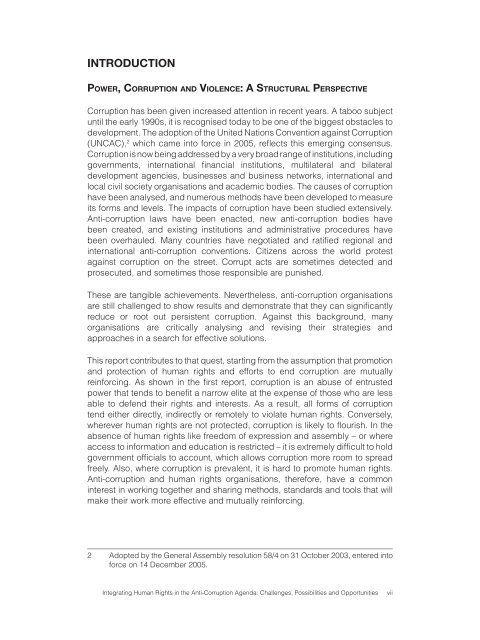Integrating Human Rights in the Anti-Corruption Agenda - The ICHRP
Integrating Human Rights in the Anti-Corruption Agenda - The ICHRP
Integrating Human Rights in the Anti-Corruption Agenda - The ICHRP
You also want an ePaper? Increase the reach of your titles
YUMPU automatically turns print PDFs into web optimized ePapers that Google loves.
Introduction<br />
Power, <strong>Corruption</strong> and Violence: A Structural Perspective<br />
<strong>Corruption</strong> has been given <strong>in</strong>creased attention <strong>in</strong> recent years. A taboo subject<br />
until <strong>the</strong> early 1990s, it is recognised today to be one of <strong>the</strong> biggest obstacles to<br />
development. <strong>The</strong> adoption of <strong>the</strong> United Nations Convention aga<strong>in</strong>st <strong>Corruption</strong><br />
(UNCAC), which came <strong>in</strong>to force <strong>in</strong> 2005, reflects this emerg<strong>in</strong>g consensus.<br />
<strong>Corruption</strong> is now be<strong>in</strong>g addressed by a very broad range of <strong>in</strong>stitutions, <strong>in</strong>clud<strong>in</strong>g<br />
governments, <strong>in</strong>ternational f<strong>in</strong>ancial <strong>in</strong>stitutions, multilateral and bilateral<br />
development agencies, bus<strong>in</strong>esses and bus<strong>in</strong>ess networks, <strong>in</strong>ternational and<br />
local civil society organisations and academic bodies. <strong>The</strong> causes of corruption<br />
have been analysed, and numerous methods have been developed to measure<br />
its forms and levels. <strong>The</strong> impacts of corruption have been studied extensively.<br />
<strong>Anti</strong>-corruption laws have been enacted, new anti-corruption bodies have<br />
been created, and exist<strong>in</strong>g <strong>in</strong>stitutions and adm<strong>in</strong>istrative procedures have<br />
been overhauled. Many countries have negotiated and ratified regional and<br />
<strong>in</strong>ternational anti-corruption conventions. Citizens across <strong>the</strong> world protest<br />
aga<strong>in</strong>st corruption on <strong>the</strong> street. Corrupt acts are sometimes detected and<br />
prosecuted, and sometimes those responsible are punished.<br />
<strong>The</strong>se are tangible achievements. Never<strong>the</strong>less, anti-corruption organisations<br />
are still challenged to show results and demonstrate that <strong>the</strong>y can significantly<br />
reduce or root out persistent corruption. Aga<strong>in</strong>st this background, many<br />
organisations are critically analys<strong>in</strong>g and revis<strong>in</strong>g <strong>the</strong>ir strategies and<br />
approaches <strong>in</strong> a search for effective solutions.<br />
This report contributes to that quest, start<strong>in</strong>g from <strong>the</strong> assumption that promotion<br />
and protection of human rights and efforts to end corruption are mutually<br />
re<strong>in</strong>forc<strong>in</strong>g. As shown <strong>in</strong> <strong>the</strong> first report, corruption is an abuse of entrusted<br />
power that tends to benefit a narrow elite at <strong>the</strong> expense of those who are less<br />
able to defend <strong>the</strong>ir rights and <strong>in</strong>terests. As a result, all forms of corruption<br />
tend ei<strong>the</strong>r directly, <strong>in</strong>directly or remotely to violate human rights. Conversely,<br />
wherever human rights are not protected, corruption is likely to flourish. In <strong>the</strong><br />
absence of human rights like freedom of expression and assembly – or where<br />
access to <strong>in</strong>formation and education is restricted – it is extremely difficult to hold<br />
government officials to account, which allows corruption more room to spread<br />
freely. Also, where corruption is prevalent, it is hard to promote human rights.<br />
<strong>Anti</strong>-corruption and human rights organisations, <strong>the</strong>refore, have a common<br />
<strong>in</strong>terest <strong>in</strong> work<strong>in</strong>g toge<strong>the</strong>r and shar<strong>in</strong>g methods, standards and tools that will<br />
make <strong>the</strong>ir work more effective and mutually re<strong>in</strong>forc<strong>in</strong>g.<br />
<br />
Adopted by <strong>the</strong> General Assembly resolution 58/4 on 31 October 2003, entered <strong>in</strong>to<br />
force on 14 December 2005.<br />
<strong>Integrat<strong>in</strong>g</strong> <strong>Human</strong> <strong>Rights</strong> <strong>in</strong> <strong>the</strong> <strong>Anti</strong>-<strong>Corruption</strong> <strong>Agenda</strong>: Challenges, Possibilities and Opportunities vii

















